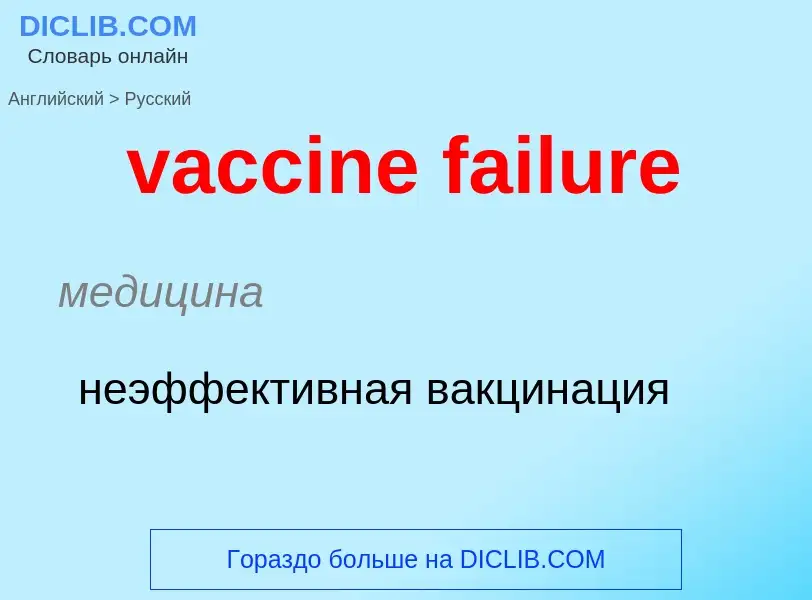Translation and analysis of words by ChatGPT artificial intelligence
On this page you can get a detailed analysis of a word or phrase, produced by the best artificial intelligence technology to date:
- how the word is used
- frequency of use
- it is used more often in oral or written speech
- word translation options
- usage examples (several phrases with translation)
- etymology
vaccine failure - translation to russian
медицина
неэффективная вакцинация
[væksi'neiʃ(ə)n]
общая лексика
вакцинация
вакцинационный
медицина
противооспенная прививка
профилактическая прививка
прививка
прививочный
существительное
медицина
прививка оспы
вакцинация
след от прививки
Definition
Wikipedia
.jpg?width=120)
Vaccination is the administration of a vaccine to help the immune system develop immunity from a disease. Vaccines contain a microorganism or virus in a weakened, live or killed state, or proteins or toxins from the organism. In stimulating the body's adaptive immunity, they help prevent sickness from an infectious disease. When a sufficiently large percentage of a population has been vaccinated, herd immunity results. Herd immunity protects those who may be immunocompromised and cannot get a vaccine because even a weakened version would harm them. The effectiveness of vaccination has been widely studied and verified. Vaccination is the most effective method of preventing infectious diseases; widespread immunity due to vaccination is largely responsible for the worldwide eradication of smallpox and the elimination of diseases such as polio and tetanus from much of the world. However, some diseases, such as measles outbreaks in America, have seen rising cases due to relatively low vaccination rates in the 2010s – attributed, in part, to vaccine hesitancy. According to the World Health Organization, vaccination prevents 3.5–5 million deaths per year.
The first disease people tried to prevent by inoculation was most likely smallpox, with the first recorded use of variolation occurring in the 16th century in China. It was also the first disease for which a vaccine was produced. Although at least six people had used the same principles years earlier, the smallpox vaccine was invented in 1796 by English physician Edward Jenner. He was the first to publish evidence that it was effective and to provide advice on its production. Louis Pasteur furthered the concept through his work in microbiology. The immunization was called vaccination because it was derived from a virus affecting cows (Latin: vacca 'cow'). Smallpox was a contagious and deadly disease, causing the deaths of 20–60% of infected adults and over 80% of infected children. When smallpox was finally eradicated in 1979, it had already killed an estimated 300–500 million people in the 20th century.
Vaccination and immunization have a similar meaning in everyday language. This is distinct from inoculation, which uses unweakened live pathogens. Vaccination efforts have been met with some reluctance on scientific, ethical, political, medical safety, and religious grounds, although no major religions oppose vaccination, and some consider it an obligation due to the potential to save lives. In the United States, people may receive compensation for alleged injuries under the National Vaccine Injury Compensation Program. Early success brought widespread acceptance, and mass vaccination campaigns have greatly reduced the incidence of many diseases in numerous geographic regions. The Centers for Disease Control and Prevention lists vaccination as one of the ten great public health achievements of the 20th century in the U.S.

.jpg?width=200)
![COVID-19 Vaccination Center of the [[Medical University of Gdańsk]], [[Poland]] COVID-19 Vaccination Center of the [[Medical University of Gdańsk]], [[Poland]]](https://commons.wikimedia.org/wiki/Special:FilePath/Anti-COVID-19 Vaccination Center GUMed Gdansk Poland.jpg?width=200)

![Physical Society, London]] Physical Society, London]]](https://commons.wikimedia.org/wiki/Special:FilePath/Edward Jenner, testimonial to the efficacy of vaccination. Wellcome L0020705.jpg?width=200)
![WHO]] WHO]]](https://commons.wikimedia.org/wiki/Special:FilePath/Global-smallpox-cases.png?width=200)


![WHO]] WHO]]](https://commons.wikimedia.org/wiki/Special:FilePath/Measles-vaccine-coverage-worldwide-vs-measles-cases-worldwide.png?width=200)
![In Sweden, [[polio vaccination]] started in 1957. In Sweden, [[polio vaccination]] started in 1957.](https://commons.wikimedia.org/wiki/Special:FilePath/Polio vaccination in Sweden 1957.jpg?width=200)

![A mobile medicine laboratory providing vaccinations against diseases spread by [[tick]]s A mobile medicine laboratory providing vaccinations against diseases spread by [[tick]]s](https://commons.wikimedia.org/wiki/Special:FilePath/Punkkibussi.jpg?width=200)
![Dr Jenner performing his first vaccination on [[James Phipps]], a boy of age 8. 14 May 1796. Painting by Ernest Board (early 20th century) Dr Jenner performing his first vaccination on [[James Phipps]], a boy of age 8. 14 May 1796. Painting by Ernest Board (early 20th century)](https://commons.wikimedia.org/wiki/Special:FilePath/Jenner phipps 01.jpg?width=200)
![[[James Gillray]]'s ''The Cow-Pock—or—the Wonderful Effects of the New Inoculation!'', an 1802 caricature of vaccinated patients who feared it would make them sprout cowlike appendages [[James Gillray]]'s ''The Cow-Pock—or—the Wonderful Effects of the New Inoculation!'', an 1802 caricature of vaccinated patients who feared it would make them sprout cowlike appendages](https://commons.wikimedia.org/wiki/Special:FilePath/The cow pock.jpg?width=200)
![''La vaccine'' or ''Le préjugé vaincu'' by [[Louis-Léopold Boilly]], 1807 ''La vaccine'' or ''Le préjugé vaincu'' by [[Louis-Léopold Boilly]], 1807](https://commons.wikimedia.org/wiki/Special:FilePath/Londre wellcome institute boilly vaccinee.jpg?width=200)
![''A doctor vaccinating a small girl, other girls with loosened blouses wait their turn apprehensively'' by [[Lance Calkin]] ''A doctor vaccinating a small girl, other girls with loosened blouses wait their turn apprehensively'' by [[Lance Calkin]]](https://commons.wikimedia.org/wiki/Special:FilePath/A doctor vaccinating a small girl, other girls with loosened Wellcome V0016682.jpg?width=200)
![von Behring]] extracting the serum with a tap von Behring]] extracting the serum with a tap](https://commons.wikimedia.org/wiki/Special:FilePath/'Serum straight from the horse'., inoculation caricature Wellcome L0009827.jpg?width=200)

